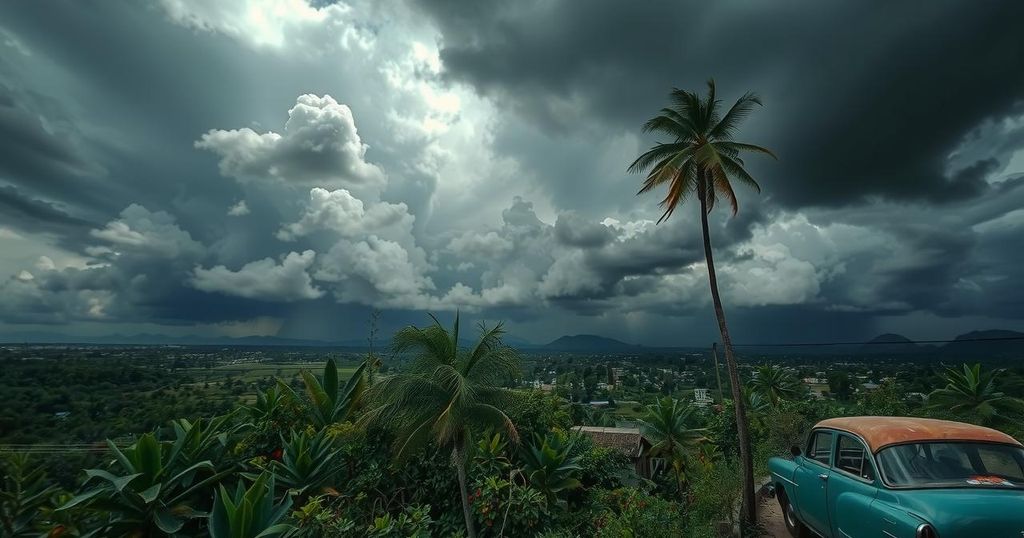Cuba Faces Prolonged Blackouts Amidst Hurricane Oscar Threat

Cuba has been plunged into a third consecutive day without power as restoration efforts falter due to the strain on its aging grid. The arrival of Hurricane Oscar adds urgency to the situation, with many residents experiencing critical disruptions in daily life and essential services. Protests have emerged in response to prolonged outages, which the government attributes to various factors including economic sanctions and infrastructure issues.
Millions of Cubans have experienced a third consecutive day without power as efforts to restore electricity falter under the strain of an aging energy infrastructure. The Cuban Electrical Union reported that approximately 16% of the nation had power restored when the grid succumbed to overload conditions late Saturday. Officials have not provided any updates regarding when full service might resume. The situation has worsened as the impending arrival of Hurricane Oscar threatens to bring severe winds and surf to eastern Cuba, further complicating recovery efforts. According to the National Hurricane Center, Hurricane Oscar, which made landfall on Inagua Island in The Bahamas with maximum sustained winds of 80 mph, is projected to reach the northeastern coast of Cuba by Sunday afternoon. While some weakening is anticipated post-landfall, Oscar might still be classified as a tropical storm when it moves away from Cuba late Monday. This blackout scenario marks the third widespread power failure since Friday, following a major power plant failure that initiated the crisis. Despite initial restoration efforts, the country suffered an additional blackout Saturday morning, effectively prolonging the electrical outage for the majority of its ten million residents. This disruption poses grave challenges, particularly regarding water supply and food preservation. In search of updates, many individuals have turned to WhatsApp to share information about power availability, while others coordinate efforts to store medications in the refrigerators of those fortunate enough to temporarily have electricity or access to generators. In Havana, residents endured lengthy waits to secure bread from the few operational outlets, leading to tensions and disputes among those in line. The community’s frustrations were palpable, with many reflecting on the absence of traditional allies like Venezuela, Russia, and Mexico, who previously supplied essential oil to maintain power supplies. Notably, tourism remains apparent, with visitors seen navigating Havana’s iconic streets in vintage cars, yet many hotels report fuel shortages for their generators. Reports indicate that José Martí International Airport in Havana is operating on emergency power, affecting ticketing and climate control in the terminal. The government has faced criticism amidst protests erupting in various regions, highlighting the citizens’ dissatisfaction with the energy crisis, which officials attribute to factors like US economic sanctions and the deteriorating state of the country’s infrastructure. In a televised address, Prime Minister Manuel Marrero Cruz indicated that the government has ceased many economic activities to prioritize energy generation for the people. The Health Minister, José Angel Portal Miranda, confirmed the reliance on generators for health facilities, ensuring that essential services continue amidst the crisis.
Cuba has been facing significant challenges in its energy sector due to a combination of outdated infrastructure, economic sanctions, and natural disasters. The island’s electrical grid has suffered multiple collapses in recent years, exacerbated by hurricanes and the impacts of international economic conditions. The recent power outages have resulted not only in significant inconvenience for the populace but also in serious threats to essential services such as healthcare and food safety. The government has been forced to ration power production and prioritize essential services during these outages, leading to widespread public frustration and protests against the backdrop of ongoing economic challenges.
The persistent power outages in Cuba, compounded by the looming threat of Hurricane Oscar, present significant challenges for the island’s population. The failure of the energy grid, marked by multiple blackouts, has severely disrupted daily life and essential services. Government efforts to address the crisis have been met with frustration from citizens seeking basic necessities like food and reliable healthcare. As structural problems within the energy sector remain unresolved, the people of Cuba face a critical moment in the face of both infrastructural shortcomings and natural adversities.
Original Source: www.cnn.com






